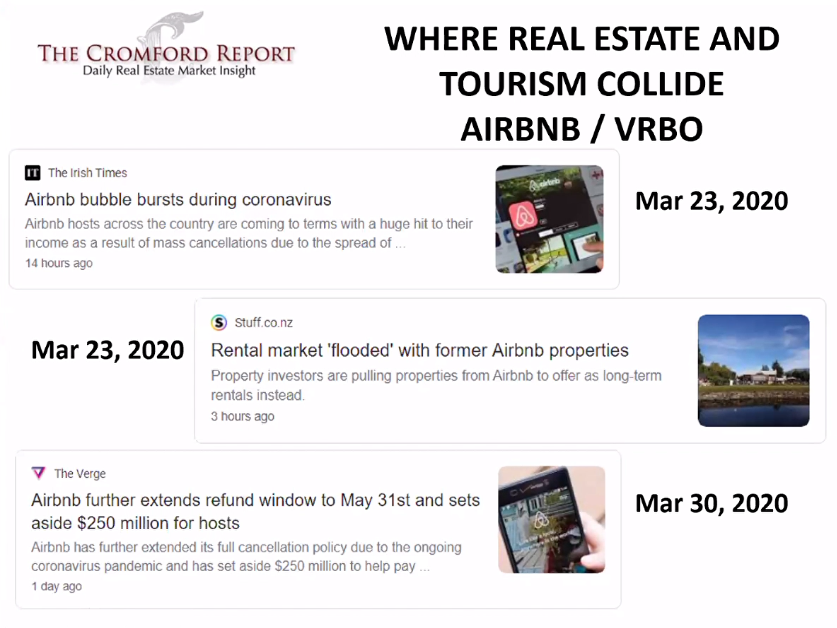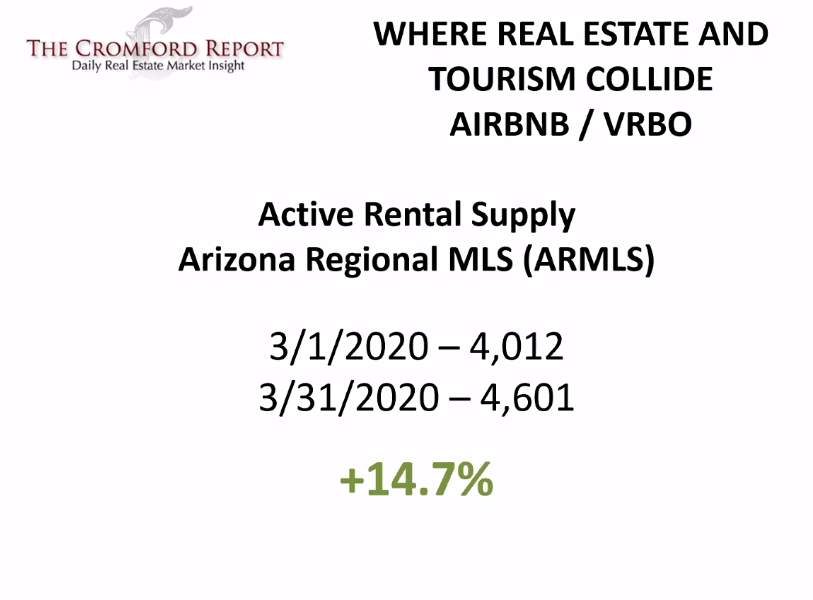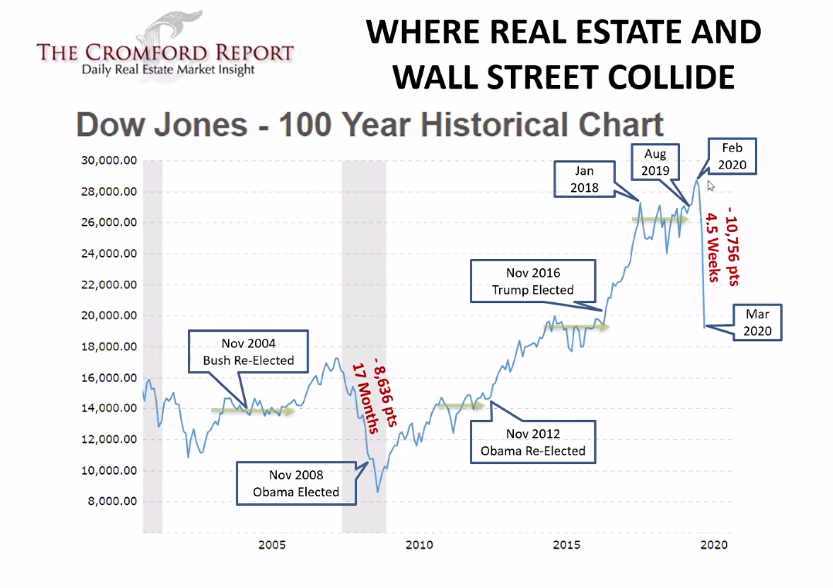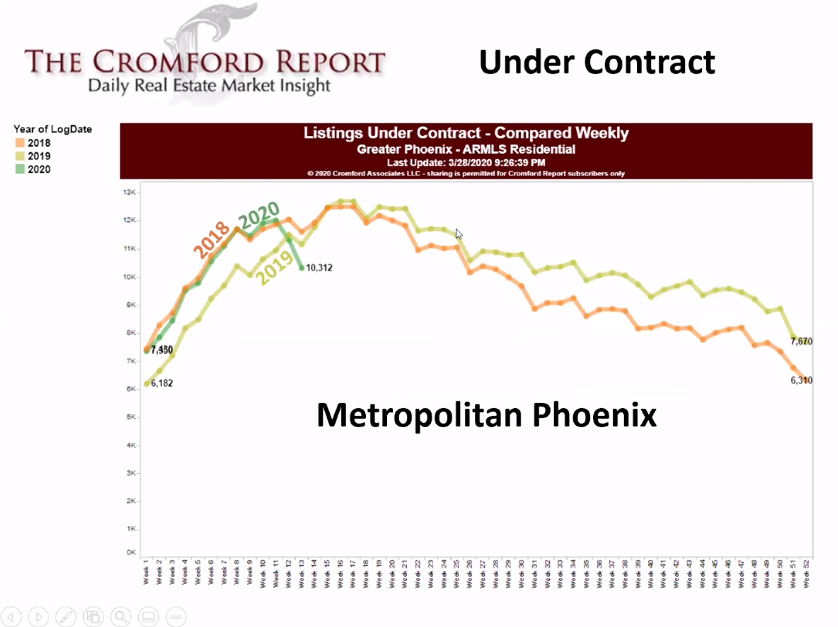
COVID-19's Impact on Our Real Estate Market
Recently, Airbnb announced that it would allow guests to get automatic refunds for reservations they made on or before March 14, 2020. At the moment, Airbnb lets guests cancel any reservations that were planned to occur between now and May 31, 2020. While this response to the COVID-19 crisis is understandable, it has essentially wiped out the vacation rental industry overnight.
Owners are now left with a great deal of uncertainty and are confronting lost income. In response, some owners are choosing to abandon the short-term market and list their homes as long-term rentals. This change is one of the reasons why the MLS volume for long-term rental homes has jumped up by 14 percent.

The Supply of Rental Homes Increased in March
According to the Arizona Regional MLS (ARMLS), the state's active rental supply was at 4,012 at the beginning of March. By March 31, 2020, this number increased by 14 percent to reach 4,601 properties. While part of this change was due to Airbnb homes, there are other factors causing this market adjustment as well.
When buyer confidence is low like this, we generally expect longer rental times. Property owners want to be certain about their cash flow, so they are renting for longer periods of time. Meanwhile, prospective home buyers are choosing to rent while they wait to see what happens with real estate values and the overall economy. While there is still demand for homes, prospective buyers are waiting for the uncertainty to disappear. These factors are helping the long-term rental market.

Dealing With a Stock Market Crash
The rental and tourism industries are not the only parts of the economy to be affected by recent events. To put everything in perspective, the stock market has recently suffered from a surprisingly sharp crash. In just 4.5 weeks, the Dow Jones Industrial Average has dropped by 10,756 points. During the 2008 recession, it took about 17 months for the market to decline by the same amount.
In addition to being a devastating turn of events for investors nearing retirement age, this crash has also impacted the nation's real estate volume. Many real estate buyers depended on the performance of their stock investments in order to buy real estate properties. Because of this, buyers are backing out of deals because their Wall Street investments have soured. While home values have not been affected yet, the overall real estate volume has taken a hit.
We have already seen the impact of Wall Street on real estate offers. As soon as the stock market started to decline, Offerpad stopped sending offers. Wholesalers stopped buying properties, and Zillow backed out of its existing contracts. On March 23, 2020, Zillow, Opendoor and Offerpad completely suspended their home purchases. By March 26, 2020, Zillow began ending contracts that were already in the escrow process.
These changes all occurred about 12 to 13 weeks after the COVID-19 crisis began. This was also the time period when escrow fallouts increased. In week 12, there were 859 escrow fallouts. During the following week, this number increased to 759. This number may actually decline in the future because there will be fewer sales happening, which means that there would naturally be a lower rate of escrow fallouts.
This does not mean that real estate prices will decline at all. Normally, sellers put their property back on the market after an escrow fallout. If they do not get an offer right away, they will make changes like repairing the roof or adjusting their landscaping. When these changes do not work, sellers will make seller concessions. During the third quarter of last year, we saw the lowest level of seller concessions in five years. While this could change as new data comes in, it indicates that prices are unlikely to change significantly right away.
It is also possible that the monthly average price per square foot could decline, but this does not mean that the actual property values are declining. Normally, there is a dip in value every summer because luxury properties are removed from the market. The other properties are still available at the same price, but the average price per square foot is lower because luxury homes disappear from the marketplace until October. Right now, we may see changes in the monthly average price per square foot because of the luxury marketplace, but this change does not mean that the average home actually has experienced any change in value.

Real Estate Volume May Continue to Fall
Wall Street funding has dried up, which means that iBuyers like Zillow and Opendoor do not have enough funding to continue buying properties. While luxury properties are still doing surprisingly well, the number of luxury sales will most likely fall because stay-at-home orders will keep buyers from flying to Arizona. All of these factors impact real estate volume, which will most likely continue to decline.
It is impossible to know how long this situation will last, but the real estate market is still healthy. Over the last few years, lending has been cautious. Unlike the 2008 recession, lenders have not been giving away interest-only loans. Borrowers have been required to show proof of their stated income, so the market is based on solid home buyers and real income information. While society may be confronting a crisis, it is not dealing with a bubble.
The only thing that is affecting the marketplace right now is COVID-19. It has impacted consumer sentiment and caused a slump on Wall Street. Out-of-state buyers are also unable to tour properties and make offers. All of these factors mean that selling and buying activities are currently on hold. Once the COVID-19 crisis is over, there will probably be a surge of buying and selling activity because pent-up demand will finally be unleashed.
We more than willing to discuss this with our current and potential owners and investors. If you have any questions about how this could impact your investment property or property management in Phoenix, please feel free to contact us at Service Star Realty!
Service Star Realty
1525 N Granite Reef #16, Scottsdale, AZ 85257
(480) 426-9696













